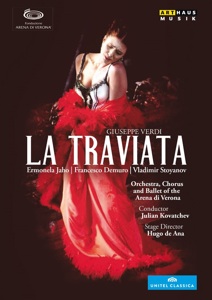It’s rare to encounter a video of an opera that has zero redeeming qualities, but I think I might have found it: the latest Arena di Verona La Traviata. It’s truly awful from every perspective: singing, acting, production, musical values. There’s really just no reason it’s on the market
. The liner notes say that the performance took place in 2011. It should have stayed in the vaults.
The production is typical for the Arena di Verona: a gaudy tourist trap monstrosity. First of all, this isn’t the right opera for an arena. The intimacy of Verdi’s masterpiece is completely lost among the mammoth sets (consisting of huge, fancy picture frames) and the circus-like costumes. Hugo de Ana’s “direction” is nonexistent: the singers basically belt to the huge outdoors crowd like a concert opera. There was more blocking in a Pavarotti arena concert.
The costumes are “traditional” which basically means that Violetta is a crinoline while all the courtesans around her are dressed for a retro-Vegas show. The only slightly original thing is having a group of men “assess” the expensive belongings of Violetta during the Act Three prelude. It’s the only part of the video that rings true—it did actually happen in real life after Marie Duplessis’s death. There really was a tacky auction of her belongings to pay off her famously expensive tastes and gambling debts. Even the bleakness of the final moments of La Traviata is ruined by a group of clowns rushing onstage to do a few laps before being ushered offstage. Why? Who the hell knows.
In this digital, social-media age there’s less and less justification for a “period” La Traviata. You can go online to a number of sites and see how saturated the high-end prostitution market is, especially in major cities. There are websites that specifically set up sugar daddies and their “sugar babies.” As a side note, a few weeks ago, a girl I follow on Instagram gleefully posted pictures of herself attending the “Fetish Con” in Florida with her “mentor,” who looked to be about 40 years older than her and 200 pounds heavier. She didn’t just post pictures of her at the Fetish Con. She posted pictures of the plane tickets. The hotel room. The dress her mentor bought her. The shoes. The $3,000 bottle of champagne. The world of “Violetta” lives.
But so do crappy productions of La Traviata. The opera is strong enough that compelling portrayals by the leads can make even the gaudiest most by the numbers production watchable. Richard Eyre’s Covent Garden production has been selling out since the 1990’s. Ermonela Jaho is not that Violetta to turn things around. She’s a perfectly pleasant looking woman until she opens her mouth.
At first I was shocked that the quavery, off-key, toneless sound that came out of her mouth was actually her voice. Maybe she needed to warm up. But nope, that’s her voice. She has a fairly solid range and okay coloratura, but the timbre is just flat out unlikable. Every time she has to let the voice bloom (“Amami Alfredo,” “Addio del passatto”) what comes out is inevitably an off-pitch quaver. She has zero breath control and thus phrases are just cut off or taper into nothing. When she applies pressure to the voice, the pitch strays even more.
Jaho’s acting is bland and inoffensive. She does all the things Violettas are supposed to do—she kicks off her clothes/heels for “Sempre libera,” she looks dignified when confronting Germont, she dies prettily. But she projects absolutely nothing—no charisma, no charm, no hints about why this woman climbed to the top of her profession. You kind of wonder how she even snuck into a fairly A-list career in the extremely crowded field of lyric sopranos.Her supporting cast isn’t any better. Francesco Demuro (Alfredo) has a thin, instantly forgettable tenor, and whether it was the production or just him, he made Alfredo even more of a tool than usual. Maybe it was the purple lipstick. His strangulated “O mio rimorso” made you long for Toscannini-era cuts. Vladimir Stoyanov (Germont) was inoffensive but forgettable. Conductor Julian Kovatchev leads a workmanlike account of the score.




